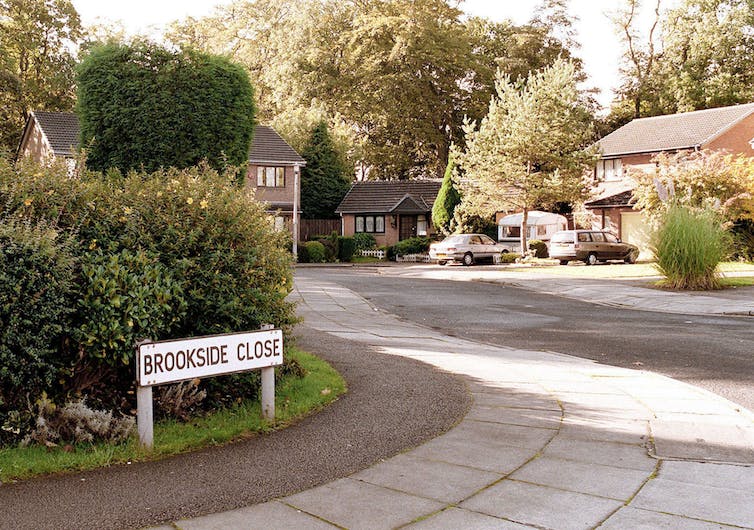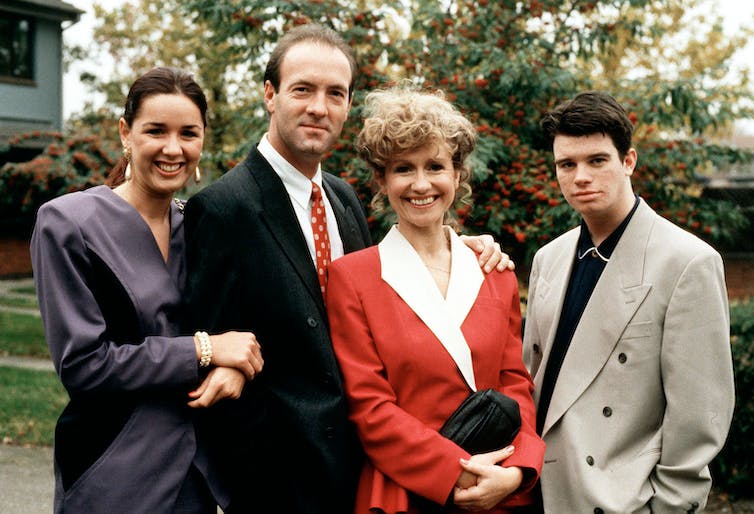The Grant household, a few of Brookside's most well-known characters. Lime Pictures / STV Player
If you need to perceive how Margaret Thatcher formed Britain, revisiting one explicit Eighties cleaning soap opera is a superb place to begin. Brookside, a present set in a Liverpool cul-de-sac, ran for 21 years, airing just below 3,000 episodes between 1982 and 2003.
Brookside was due to this fact conceived amid the Thatcher administration’s first time period, and a notable eight years of its broadcasting output coincided along with her tenure.
The present is now being rebroadcast in full on digital channel STV. I’ve watched over 150 episodes thus far, discovering on the similar time, a notable useful resource for social historians or certainly anybody within the modern impression and longer-term legacy of Thatcherism.
A particular location
Brookside Close, the place the present was filmed, was not a TV set however a part of an actual non-public housing property – on the time, Europe’s largest. To make Brookside, Mersey Television bought a small nook of a flourishing improvement that noticed round 1,000 new properties constructed over a seven yr interval within the Eighties.
The rising residential space typified the modern “new proper” imaginative and prescient of aspirational house possession.
According to the Thatcherite ideology of financial liberalism, such rising estates would ideally produce a brand new era of householders and, in the end, Conservative-inclined voters. UK home-ownership elevated throughout the Eighties and a few areas with rising owner-occupation shifted in direction of the Conservatives at the moment (notably within the south east).
However, regardless of such non-public housing tendencies, there was a marked anti-Conservative swing in Liverpool’s six parliamentary seats between 1983 and 1987, significantly above the nationwide common.

Brookside was filmed in actual homes on an actual road quite than a TV set.
Lime Pictures / STV Player
Riots had hit Liverpool’s Toxteth district in 1981 and had been adopted by allegations of government-driven managed decline. Meanwhile the town’s “Militant” metropolis council was, by the mid-Eighties, engaged in a high-profile ideological conflict with Thatcher’s administration.
Brookside’s particular geographical location due to this fact supplied a particular political edge and social barometer. It more and more got here to mirror the vibes of rising opposition to Thatcherism, which in the end unfold throughout the nation as the last decade progressed.
Fluid social standing
Brookside featured class-based tensions that mirrored the demographic change and social fluidity that emerged within the Eighties. Some recurring characters such because the Grant household represented the upwardly-mobile working lessons – individuals who purchased into housing developments like Brookside Close as a part of the climb up the social ladder.
Meanwhile, households such because the Collins had been a part of a downwardly-mobile center class. They represented the many individuals who had been pressured to downsize and relocate on account of cash troubles introduced on by the extended recession of the early Eighties.
There had been additionally yuppies (the Huntingtons, who had been youthful and extra prosperous skilled individuals with materialistic tendencies) and even characters from the very early laptop expertise era (Alan Partridge, who labored from house earlier than it was cool). The shut additionally had black market wheeler sellers in Barry Grant and his associates, and houseproud neighbourhood busybodies (Harry Cross).

The Corkhill household.
Lime Pictures / STV Player
These character classes could be seen as illustrative of the occasions, notably the shifting class dynamics and altering employment patterns fuelled by Thatcher’s insurance policies. Most of the unique households on the shut had been adapting to adjustments within the employment market, a method or one other.
No such factor as society?
During the Eighties, Brookside more and more featured a story of resistance in direction of Thatcherism. It was an outlook that stemmed from the leftwing politics of Brookside’s creator Phil Redmond and rising writers like Jimmy McGovern.
Leftwing actors similar to Ricky Tomlinson (who performed Bobby Grant) additional mirrored this aura. Redmond lamented in 2021 that modern-day cleaning soap operas don’t “sort out the actual social points” in the identical means they did within the Eighties.
The underlying anti-government sentiment might typically be recognized in Brookside’s dialogue. In mid-1983, for instance, when Sheila Grant requested her husband Bobby “the place would we be if all of us considered ourselves?”, he swiftly replied: “The Conservative celebration”.
But of their makes an attempt to navigate their variations, the residents of Brookside Close challenged certainly one of Thatcher’s most notorious assertions – that there’s “no such factor as society … there are particular person women and men and there are households”.
The sense of society and group that developed within the present’s plotlines can be certainly one of its hottest traits, making it a scores success by the center of the last decade.
Yet by the mid to late Nineties, the present went into decline following a comparatively golden interval of tv reputation throughout the second half of the Eighties. There was maybe much less to rail in opposition to throughout the New Labour period. It might be argued that Brookside flourished whereas Thatcherism thrived.
To watch Brookside once more in 2023 is to see Thatcher’s premiership each implicitly and explicitly mirrored in modern on a regular basis life. Characters from a number of households confronted unemployment and there have been even plotlines about strikes.
The battle of assembly mortgage funds was ever current for residents on the shut and tensions between generations and lessons performed out in typically spectacular trend.
Brookside thereby offers a human angle by which to analyse the impression of a few of Thatcherism’s most high-profile insurance policies throughout a monumental decade of cataclysmic political and social change.
![]()
Ben Williams is a member of the UCU and Amnesty International
